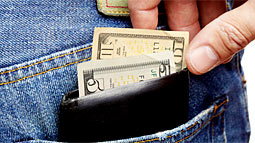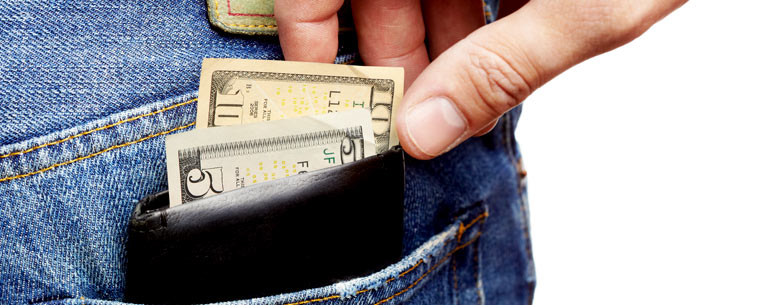When you see the word pickpocket, you may envision thieves operating in a glamorous and crowded foreign location, for example, around the Eiffel Tower in Paris or in the Roman subways. However, the reality is that pickpockets operate everywhere, including in the United States. They operate in Washington, D.C., New York City, San Francisco and in many small areas. Pickpockets work so smoothly that you'll rarely feel them reach inside your pockets. They fold the lining of your pocket up and up until your valuables are within reach. The elapsed time? No more than two seconds. No matter where you go, it's smart to be aware of how to avoid being pickpocketed.
Don't Fall for Theatrics
Many pickpockets operate alone, but teams of two or more are not rare. In a team, the first person fishes items away from the victim and hands them to another member. A female team member, or even a child, may distract the victim with conversation while the stealing takes place. One of their tricks is to drop something or feign injury; people who try to help or to assess the situation have their pockets picked.
So what's the solution? Keep moving. Stay purposeful. Help people by informing the nearest police officer of what's going on instead of directly assisting.
Beware of Hugs
One possible scenario: The local sports team's just won big, everyone's celebrating at pubs, and as you enter a pub, a drunken fellow stumbles out and gives you a friendly, happy hug. However, the hug may not be as sweet as it appears; pickpockets often use hugs to rid you of a little weight. No one likes to be mean, but you want to keep your valuables. Step away if someone's coming for you with a hug in mind.
Take the Upper Hand with the Map Ploy
One technique that pickpockets use is to approach you with a paper map. They lay it out over your pocket or purse while they ask for help or directions; it's the perfect way to conceal the stealing that's going on under the map. After they've gotten what they want, they suddenly recall where they're going and leave. While the best solution is to avoid helping people toting maps, you can try keeping your purse or bag in front of the map. However, simply being approached for help may be sufficient distraction for a second member of a pickpocket team to grab your valuables. Your best bet is to refrain from stopping. Just keep moving.
Become Unpredictable
If you believe someone is watching you with an eye to steal your valuables, turn to unpredictability. Go into a store for a break of a few minutes, reverse directions or move to the other side of the street. Of course, to be aware of people watching you, you must know your environment. If you're entering an enclosed space, take in what's around you -- and who's around you. Keep an eye out for people who appear to be overly interested in you.
When you have to stop moving, like to study a map or take in a landmark, stand with your back against a wall so that people can't bunch up around you. If this approach is not feasible, stay in a wide-open area. Check your phone and maps in a store rather than in a crowded place. And for goodness' sakes, don't tote around paper maps that slow you down. Switch to mobile maps.
Enlist Clothing as an Ally
One trick pickpockets use takes place in narrow locations, such as the entrances to escalators. One team member distracts you by starting to get on the escalator ahead of you, changes his mind, and bumps into you as he steps off the escalator or out of the line for the escalator. Meanwhile, the second team member picks your pocket. Outfox them by strategic placement of your valuables.
Avoid putting valuables in back pants pockets and the pockets of sports jackets and suit jackets. Pickpockets don't like buttoned or zippered pockets, particularly if they're front trouser pockets, so those are good choices to stow your valuables. In any case, bring out only what you're comfortable losing; leave everything else in your accommodations. Keep keys on a chain connected to your clothes, and avoid large wallets because they're easier for pickpockets to spot and steal.
If you use a purse, never put your wallet in it. Instead, keep it in a pocket that's buttoned or zippered, and make sure there's no bulge. However, you still need to protect your purse and the valuables inside. Wear your purse strap diagonally, and if you're using a handbag, position it at the front of your body.
Bonus Tip for Groups
If you're traveling in a group, choose one person as a lookout. Keep the gullible and excitable people--including kids--in the middle of the group. The more aware members should walk at the back of the group.
Pickpockets are as inevitable as death and taxes. However, with a few proactive steps and smart behavior, you can outfox the people intent on stealing your valuables.








Share this Page